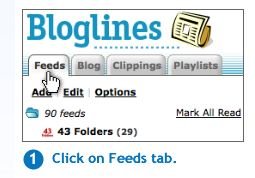The Changing Face of RSS

This weekend saw dueling announcements that painted a sharp contrast about the future of RSS. First, the big news from a slow weekend. was that Ask.com is shuttering it’s Bloglines Reader. Once one of the most popular RSS readers, Bloglines has maintained a strong following but has largely taken a backseat to Google Reader as a Web-based RSS reader.
Still, its closure comes as surprise and is being viewed as a sign that RSS is about to meet its maker.
However, a separate announcement came from Automattic, which has added a new RSS-based subscription feature to its WordPress.com offering. The idea is to make RSS usable and approachable to people who aren’t as tech savvy as your average RSS user and compile RSS feeds into a Facebook-like news stream.
What does this mean for RSS as one Internet company enters the field and another makes an exit? There’s no clear answers but one thing is certain, content creators need to pay close attention.
A Changing Relationship
Bloggers and other content creators have always had a love/hate relationship with RSS. On one hand, it has been a powerful and compelling way to engage and stay in contact with readers. Everything from RSS readers to RSS-to-email services have kept readers connected and reading more content.
On the other hand, RSS has been accused by some of robbing sites of page views, a notion FeedBurner disputes, and has opened the door to RSS scraping by spam bloggers and other garbage sites.
However, RSS adoption never really took off. In 2008, RSS adoption was at 11% and it largely peaked there. The years since have seen widespread growth in social networking, including Facebook and Twitter, but limited growth in RSS use.
This is a story I’ve seen first hand here at Plagiarism Today. My RSS subscribers, according to FeedBurner, have been flat (though FeedBurner stats have not been very reliable) even though I’ve seen growth in pageviews, Facebook and Twitter subscriptions. Though RSS is still a major way to access this site’s content, now more people view the site on Twitter and Facebook than RSS.
Simply put, mainstream users never really understood or made use of RSS, finding it too complicated and hating having a “second inbox”. RSS may never be widely used for its intended function, but that also doesn’t mean that it’s dead, contrary to what TechCrunch may say, just an indication that the function is changing.
Changing Faces
RSS may not be a destination much longer but it is still an important tool and an important means. Feeding Facebook, Twitter and other social news sites requires a standard to distribute the content, something RSS provides.
But as RSS’ relationship with readers change, so it will with content creators. Slowly, it’s possible content creators will abandon public RSS feeds and favor private ones they feed to their various channels. The idea of a partial feed will become less egregious as RSS’s function is pushed to fit into 140 characters and other short status updates.
Where once RSS was viewed as the ideal way to follow a site, it is slowly becoming the way to feed the new ideal ways to follow a site. In short, it’s the tool that enables realtime, not the destination for it.
Looking Forward
Many creators, myself included, have been downplaying RSS on their sites for some time but the question is what will you be doing? Will you be looking at making your RSS private, switching to a truncated feed or staying the same? Will you be shifting focus to other methods for readers to connect or continue with RSS?
I don’t have any firm answers for myself, only what I’ve done in the past (almost without realizing what I was doing), but I can’t see myself ditching RSS completely or truncating my feed. There are still several thousand who read this site via RSS and I have no desire to cut them off or impede their reading.
But it is clear RSS won’t be the way of the future for me, or likely many other bloggers, at least not as a destination.
Want to Reuse or Republish this Content?
If you want to feature this article in your site, classroom or elsewhere, just let us know! We usually grant permission within 24 hours.
